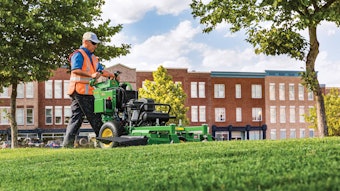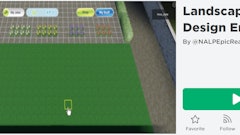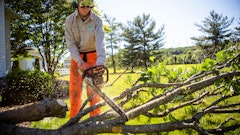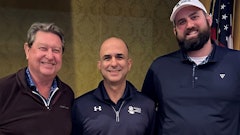
Of all the changes Nick DiBenedetto, CLP, and his business partner Manuel De Souza have seen over more than 25 years in the business, the biggest one, they say, is with the customer.
“Our customers are driving us to bring more to the table,” says DiBenedetto, who launched N.D. Landscaping 26 years ago. “They want landscapes that truly add to the quality of their lives. Water features—including attractive pools, inviting spas and dramatic falls—are only part of the story. Homeowners want outdoor kitchens with all the fixings. They want granite counter tops, decorative stone walls with pillars, and exterior additions just steps away from their patio doors.”
SOME SERIOUS KNOWLEDGE REQUIRED
With the increased demand comes the need for contractors to become more knowledgeable in all aspects of landscape construction, from understanding conservation requirements, site planning and permitting regulations to solving drainage issues, running a labyrinth of lines for gas and electric power, and overall creating a virtual second home.
DiBenedetto is not alone with his perceptions. De Souza manages the company's maintenance division that accounts for 40% of an annual $5 million-plus revenue stream. He began offering an upscale maintenance service called “classic care” eight years ago to satisfy a growing demand for customized maintenance.
“Out of 300 or so maintenance customers, we have at least 40 who have signed up for our classic care service,” says De Souza. “These customers want more than core maintenance, which is how we refer to a weekly regimen of mowing, trimming, blowing, and so forth. They want someone on their property every week who's actually playing the role of gardener to dead-head flowers, weed beds, prune and keep their landscapes looking immaculate. We believe that's the future of maintenance, at least in our market. Offering this level of service helps separate us from a myriad of competitors who only offer a cookie cutter service.”
Located 30 miles north of Boston in Georgetown, MA, N.D. Landscaping employs 60 people among three divisions: design/build, maintenance (including lawn care) and snow removal. The bulk of the company's service offering is to high-end residential customers. When PRO visited the owners, there were seven ongoing design/build projects ranging in price from several thousand dollars to $500,000. De Souza's maintenance division was sending out six to nine mowing crews a day; two special enhancement crews, one fertilization crew and four classic care crews.
“One area we want to grow in is maintenance,” relates DiBenedetto. “In fact, within the next few years, our goal is to bring our maintenance book of business at least level to that of our design/build business. Not to say that we will lose our focus on design/build. We won't do that, but maintenance is predictable, easier to budget, and something that we can continually hone and recast to drive out costs and become more efficient. Conversely, every design/build project is different, usually very complicated, and often a challenge to estimate.
“The bigger and more detailed a project is, the more difficult it is to price it right,” DiBenedetto continues. “It helps to price in modules, i.e., estimate the cost of the pool, the kitchen, the patio, the fire pit, the stone walk and other pieces individually, and then put them all together in a quote. Even then you cannot account for the unpredictable, including the extra cost associated with excessive rain events. The other challenge with design/build projects is that customers want you to wave a magic wand and install the project in a week rather than having to deal with construction over the course of several weeks.”
Despite the challenges, DiBenedetto is passionate about his projects, and especially enjoys designing and building large patios with magnificent pools. He also likes the selling process.
Case in point: While leaving one project a customer waves and says she has a check ready for him. DiBenedetto turns around, waves back, and says he will stop by later in the week to pick it up. “I don't want to just take the check and close out the account,” he explains. “I would rather talk about the project with her and discuss future enhancements.”
TREND LINES
When asked what's driving up expectations, the partners talk about technology and the availability of information at their customers' fingertips. But even more significant, they add, is the changing world where homeowners either want to spend more time at home or cannot afford the cost of a second home, and look forward to having a recreation area that their entire family and friends can appreciate.
“It's amazing to me to see how our customers are using their redesigned landscapes,” says DiBenedetto. “Family members will be cooking out, playing volleyball, sitting around a fire pit, swimming, and all the time moving freely between the house and the yard. When selling landscapes, we explain to customers that in comparison to interior home construction, the square-footage price they will pay for their landscape is truly minimal.” Not to mention, he adds, the many benefits, including the fact that functional backyards will encourage children to spend more time outside, away from computer and television monitors, and they will provide a recreational area for friends. “As a parent, wouldn't you like to have your teenagers' friends swimming and playing volleyball at your house, rather than being someplace else?” DiBenedetto asks.
“Most customers are not going to invest in a beautiful backyard without making arrangements to have it maintained,” adds De Souza. “That's why many of our customers want the service level a personal gardener provides. Each of our four classic care crews is comprised of two people. As a general rule, we block out eight-hour days for each customer, meaning that a crew of two will spend a half day a week on a property. This is in addition to a mowing crew making its weekly visit.
“Sure, some customers will balk at the cost of classic care, which can be upwards of $10,000 to $30,000 a year or more depending on the property,” De Souza continues. “But nine times out of 10, if they sign up for it and experience it, they will want that level of service forever.”
LEARNING CURVE
DiBenedetto incorporated his company in 1982 after spending a couple of years in high school mowing and cleaning up yards. His high school friend Manny (De Souza) joined him five years later. The two admit that despite working long days, their business didn't begin to show a profit until the early 1990's.
“This is a challenging business with lots of moving parts,” DiBenedetto emphasizes. “If you run it right—have all the right insurance, pay your people a living wage, and operate and maintain quality equipment—margins are very tight.” N.D.'s owners saw glimmers of light at the end of the tunnel after they joined the Professional Lawn Care Association of America (PLCAA) in the mid 1980's and started networking and benchmarking their business. They continued developing a network of friends after PLCAA and the Associated Landscape Contractors of America (ALCA) joined to form the Professional Landcare Network (PLANET).
“When we started, we didn't know that a design/build business should generate approximately $100,000 for every employee or that every maintenance employee should represent about $70,000 in revenue. We also had no idea how much work a typical account manager could handle. Once we started meeting people and sharing thoughts, we could compare our business model to others. We discovered how some owners reached the $1 million plateau and how others catapulted over that number to become bigger and more profitable.”
Through their new network of friends, DiBenedetto and De Souza were introduced to several key industry consultants who they still routinely invite to their facility. Two years ago the partners joined a peer (networking) group comprised of five other like companies from around the country.
“You don't have to be a big player to make networking work,” DiBenedetto emphasizes. “My advice to owners starting out is to identify a couple of companies that are doing the type and quantity of work that they want to do, and get to know the principals. They can do that by joining local and regional groups or by joining a national group like PLANET. Either way, the move will dramatically shorten their learning curve.”
ON YOUR OWN
Although peer groups and networks offer timely advice, they don't make the sale and get the work done. For the past eight years, N.D. Landscaping had built much of its business around returning H-2B guest workers. As the owners explain, these employees were well-trained, knew the accounts, and were well-liked by customers. “They were part of our extended family,” De Souza relates. “This spring, however, we couldn't get their visas approved because Congress failed to fold returning guest workers into the H-2B program. In other words, we were shut out.”
Adds DiBenedetto, “Ripping out 30 people from your company creates a difficult situation, to say the least. Manny and I, along with our leadership team, became real strategic in a hurry and focused on finding and hiring new employees. We bumped our advertising budget, hung flyers and hosted a job fair where more than 80 people showed up. Among incentives, our company offered signing bonuses, and new hires were given two full weeks of training before going into the field. We filled all positions by the target date.”
“All together, I think we spent upwards of $100,000 rebuilding our team this spring,” says De Souza. “But the effort paid off, even though we've had to replace several of the new recruits, and we continue to recruit throughout the year.” De Souza agrees with his partner that their company will never again be held hostage by a government program or let Congress dictate how much they can grow.
“Pundits were saying that many companies like ours would go out of business because our legislators failed to act on H-2B,” says DiBenedetto. “Small business owners, though, are accustomed to meeting challenges head on. We did—and I believe we're better off as a company and better postured for growth than ever before.”
There have been and continue to be other challenges, DiBenedetto points out. Their company participated in a LEAN management program sponsored by J.P. Horizons last year to identify unnecessary costs and add efficiencies—a move that is paying back dividends this year with the increased cost of fuel and landscape supplies. Meeting increased customer expectations is also testing their ability to train employees for new roles.
DiBenedetto explains, “As an industry, I sometimes think we expect too much from our production managers. We want them to be highly skilled technically and then be able to communicate with customers, all the while they are managing a sizeable book of business. The truth is, we cannot charge enough for our work to be able to pay what this job description requires or add more people to shoulder some of the responsibility. I'm fairly optimistic, though, that this will change.”
It's a challenge from which the partners are not shying away. “As more customers start to understand the true value of their landscapes, and the importance of maintaining them, they will be willing to pay more for the services we provide,” DiBenedetto says convincingly. “It's all part of our effort to educate them, just as they are educating us to have a larger knowledge base and more skill sets to meet their expectations.”
DiBenedetto looks at his partner and adds, “I don't know how anyone can run a business like this without having a partner to help meet the challenges. Manny and I are as different as night and day, yet share the same growth goals. We structure and run our divisions like we want to, yet totally agree on important fundamentals such as sharing key company data with managers.”
“It's all about communicating,” adds De Souza. “We talk every day. If there's an issue, we won't let it become serious. There's too much at stake for our families and our employees.”
The partners are in total agreement that the industry has changed dramatically in the 20 years since Manny joined the team. Technology, customers, equipment, government regulations, costs and concern about the environment are just a few of the changes transforming the landscape for business owners and creating a new world of challenges and opportunities—something these friends and partners are looking forward to dealing with together.
N.D. Landscaping
Georgetown, MA
ndlandscape.com
Founded: 1982
Principals: Nick DiBenedetto, CLP; Manuel De Souza
Annual Revenue: $5 million-plus
Employees: 60 peak season
Sales Mix: 60% design/build, 40% maintenance (including lawn care)
Customer Mix: 85% residential, 15% commercial
Equipment includes Husqvarna walk-behind mowers and handheld equipment; a fleet of 54 trucks and trailers, including Isuzu, Ford, Chevrolet, and International trucks and Wells Cargo trailers; Bobcat, Case and John Deere skid-steer loaders; three Toro Dingos, one Case backhoe



























